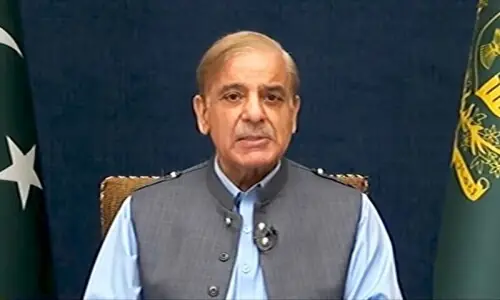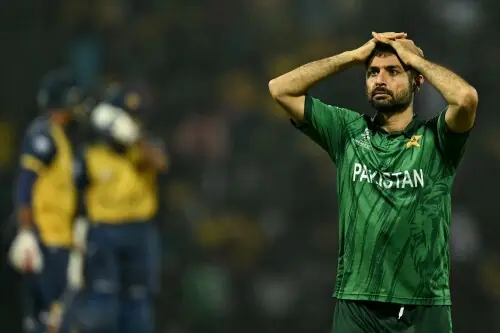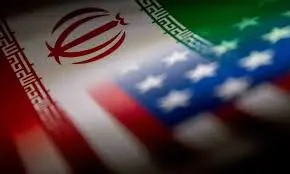• CJP appears ‘visibly disturbed’ after Justice Amin, who was part of bench that questioned suo motu power, recuses himself
• Questions emerge over strength of bench expected to hear elections date case today
• Justice Shahid defends chief justice’s constitution of bench in note of dissent
ISLAMABAD: Justice Amin-ud-Din Khan on Thursday withdrew himself from the five-judge Supreme Court bench hearing a PTI petition against delay in elections to the Punjab Assembly since he was signatory to an order issued by a different bench, proposing the postponement of all cases instituted under Article 184(3) of the Constitution.
“In view of the case No 4 of 2022 (awarding of 20 additional marks in MBBS or BDS degrees to candidates for memorising the Holy Quran), which is still in the field but the present bench is proceeding with the case (postponement of Punjab elections), therefore I recuse myself of the case,” observed Justice Amin.
At the outset of proceedings, which commenced half an hour behind schedule, a visibly disturbed Chief Justice of Pakistan (CJP) Umar Ata Bandial observed that Justice Amin would like to make a statement.
Soon after Justice Amin’s statement, the bench retired for the day. The case will now be taken up on Friday (today) at 11:30am by a bench that Justice Amin would not be part of. The announcement was made by a court assistant after an hours-long wait.
To sum up the day’s proceedings, former Additional Attorney General Tariq Mehmood Khokhar, who witnessed the entire episode, had this to offer: “The Supreme Court was… in a shambles today. The judges came rather late, suggesting last-minute desperate efforts to appear together, which they did albeit with palpable confusion, despair, distrust and discord.”
“A minute or so later, not surprisingly, the bench dissolved due to the recusal of Justice Amin-ud-Din Khan. Several hours later they managed to complete a short sentence to the effect that a new bench will take up the petition on Friday at 11:30am, without the recused judge,” he said.
During the recess, politicians like PTI Secretary General Asad Umar, Shah Mehmood Qureshi, Fawad Chaudhry, Sheikh Rashid Ahmed, senior lawyers Muhammad Akram Sheikh, Syed Ali Zafar, Irfan Qadir, Farooq H. Naek, Sajeel Shaharyar Swati and many others kept on guessing about expected eventualities like the fate of the PTI’s petition. And whether the three-judge bench order postponing cases under Article 184(3) will be overruled by the new bench was one of the topics of the discussions.
Senator Naek, while talking to Dawn, regretted that in addition to the political and economic instability, the country is now facing a full-blown constitutional crisis.
It appears, he feared, there is a division within the Supreme Court with regards to the interpretation of the Constitution and the Supreme Court Rules 1980. But in order to resolve this issue and to restore the honour of the apex court, it is essential that all these issues be resolved by a full court consisting of all judges so that the public at large should have complete confidence in judgements to be rendered by the Supreme Court in future, suggested Mr Naek.
In-chamber meeting
An informed source confided that after the bench had retired, Justice Ijaz-ul-Ahsan and Justice Munib Akhtar went to the chambers of CJP to take stock of the situation arising out of the recusal of their colleague.
The chat mostly revolved around whether the election postponement case would be heard by the remaining four judges or three judges minus Justice Jamal Khan Mandokhel, and whether the hearing will commence after overruling the order released on Wednesday by the three-judge bench in a separate case.
In the judgement issued by the three-member bench, Justice Isa and Justice Amin had held that Constitution does not grant the CJP unilateral and arbitrary power to decide how cases under Article 184(3) be listed for hearing, how benches to hear such cases be constituted and how judges hearing such cases be selected.
The judgement had also postponed all other cases under Article 184(3).
Dissenting note
Separately, Justice Shahid Waheed — a member of the three-judge bench that ordered postponement of all cases instituted under Article 184(3) a day earlier — issued a dissenting note.
Justice Waheed in his note said that the objection to the constitution of three-judge special bench could not be brought under consideration for two reasons. One, a bench — special or regular — is constituted by an administrative order of CJP. As such, the present bench is in conformity with the principle set earlier by a five-judge bench in a 2021 suo motu case and therefore the 2021 judgement takes precedence over all precedents of the Supreme Court regarding the power of CJP to constitute any kind of benches.
It appears that neither the Attorney General for Pakistan nor the PMDC’s lawyer had any objection to the constitution of the three-judge bench when the case was taken up. Given these circumstances, Justice Waheed observed, none of the judges of the three-judge bench could object to the constitution of the bench and if they do so, their status immediately becomes that of the complainant and consequently, it would not be appropriate for them to hear this case and pass any kind of order.
This reasoning has the backing of the basic code of judicial ethics, to wit, no man can be a Judge in their own cause. It is important to state here that this principle confines not merely to the cause where the Judge is an actual party to a case, but also applies to a case in which he has an interest.
The judicial propriety requires that if any judge of the bench has any objection, the proper course for him is either to recuse himself from the bench or to refer the matter to CJP with the concurrence of other judges of the bench, so that the case is assigned to some other bench, Justice Waheed said, adding the administrative order of CJP regarding the constitution of the bench becomes fait accompli when a judge in compliance starts hearing the case.
Hence, any member of this bench, after having accepted the administrative order of CJP is estopped to question the constitution of the bench on the well-known doctrine of estoppel.
Referring to the March 9 Pemra prohibition order in which satellite channels were ordered not to broadcast any content pertaining to the conduct of the judges, Justice Waheed wondered could this ever be considered in this case.
This question was not agitated by any lawyer, adding it would be otiose to discuss it here as it was neither urged by any counsel nor was it raised in the pleadings. In fact, no party was on notice to address on this question. Pemra was also not in attendance to present the rationale of the prohibition order.
“Therefore, in my view, the principle of fairness obliges us not to express a definite opinion on this question until all concerned have had an opportunity of being heard,” Justice Waheed said, adding the other reason which prevented him from endorsing majority observations was that no court should try any question and pass order which was not directly and substantially in issue in a case pending before it.
In the case at hands, the matter in issue is whether the memorisation of the Holy Quran is relevant criteria for the determination of the candidates for an MBBS or BDS degree. Indubitably, the above-stated second question is not related to the issue involved in this case and therefore it cannot be brought under debate, nor can any conclusion be drawn, Justice Waheed said.
Published in Dawn, March 31st, 2023































